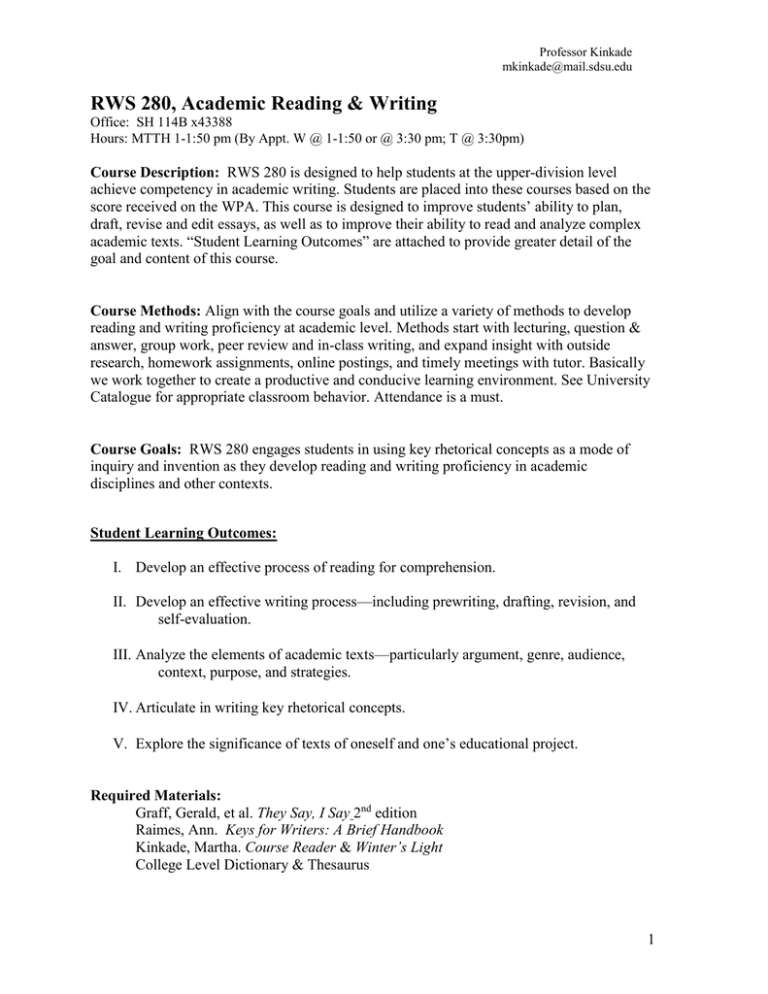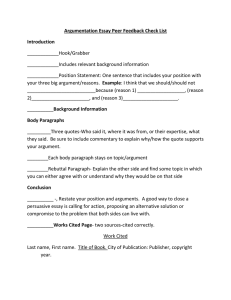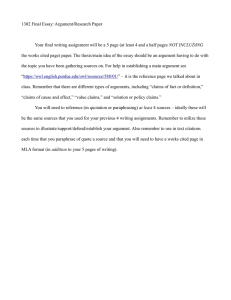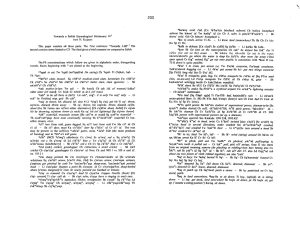RWS 280, Academic Reading & Writing
advertisement

Professor Kinkade mkinkade@mail.sdsu.edu RWS 280, Academic Reading & Writing Office: SH 114B x43388 Hours: MTTH 1-1:50 pm (By Appt. W @ 1-1:50 or @ 3:30 pm; T @ 3:30pm) Course Description: RWS 280 is designed to help students at the upper-division level achieve competency in academic writing. Students are placed into these courses based on the score received on the WPA. This course is designed to improve students’ ability to plan, draft, revise and edit essays, as well as to improve their ability to read and analyze complex academic texts. “Student Learning Outcomes” are attached to provide greater detail of the goal and content of this course. Course Methods: Align with the course goals and utilize a variety of methods to develop reading and writing proficiency at academic level. Methods start with lecturing, question & answer, group work, peer review and in-class writing, and expand insight with outside research, homework assignments, online postings, and timely meetings with tutor. Basically we work together to create a productive and conducive learning environment. See University Catalogue for appropriate classroom behavior. Attendance is a must. Course Goals: RWS 280 engages students in using key rhetorical concepts as a mode of inquiry and invention as they develop reading and writing proficiency in academic disciplines and other contexts. Student Learning Outcomes: I. Develop an effective process of reading for comprehension. II. Develop an effective writing process—including prewriting, drafting, revision, and self-evaluation. III. Analyze the elements of academic texts—particularly argument, genre, audience, context, purpose, and strategies. IV. Articulate in writing key rhetorical concepts. V. Explore the significance of texts of oneself and one’s educational project. Required Materials: Graff, Gerald, et al. They Say, I Say 2nd edition Raimes, Ann. Keys for Writers: A Brief Handbook Kinkade, Martha. Course Reader & Winter’s Light College Level Dictionary & Thesaurus 1 Professor Kinkade mkinkade@mail.sdsu.edu Course Requirements: Generally, there are four assignment types: account of argument, analysis of rhetorical strategies, argument conventions and self-as writer. These assignments types are organized to build upon conceptual and applied writing ideals. Grading Structure: Essay #1 Essay #2 Essay #3 Essay #4 25% 25% 25% 25% Course Requirements: All four essays demand various prep-work and strategies, from prereading to completed copy. Attendance is vital and I expect you’re prepared when you come to class, for our goal is to write, review and polish writing skills. In order to pass this class you must have a “C” average (75%); otherwise, you’ll need to repeat the course. Generally you can expect to spend at least 6 hours a week in preparation for this class which will also require a great deal of wring practice – on average 4-5 pages of writing each week. Please note I do not accept late work, nor work via email. A letter grade will be assigned using the following scale: A+=10, A=9.5, A-=9.2, B+=8.8, B=8.5, B-=8.2, C+=7.8, C=7.5, C-=7.2, D+=6.8, D=6.5, D-=6.2, F=5.5, no work turned in=0. All graded work is expected to adhere to MLA format. Final Grade Breakdown (grade averages are not rounded up): A(100-93); A-(92.9-90); B+(89.9-87); B(86.9-83); B-(82.9-80); C+(79.9-77); C(76.975); C-(74.9-70); D+(69.9-66); D(66.9-63); D-(62.9-60); F (59.9-below) Attendance & Activities Policy: Please note that I take attendance and expect you here. I consider this part of your job as a student, I especially note if you’re here for peer or group work since I find those elements vital to the writing process. In addition, I review Discussion Board postings hold them in the same arena as attendance. So I give you a little leeway to account for life happening. I look for 80% completion of DB/homework & attendance before your final grade is affected. Basically, if you miss more than 4 class sessions (this includes missing tutor appointments), your final course grade will be marked down ½ grade for each additional class missed. If you’re experiencing a prolong illness, please let me know; otherwise, please get your homework from fellow student. I don’t accept late work or excuses. An education has high value and demands high standards. **Plagiarism is not accepted and if applied will result in a Failing grade for the course and reported to the appropriate University officials. For Students with Disabilities: If you are a student with a disability and believe you will need accommodations for this class, it is your responsibility to contact Student Disability Services a (619) 594-6473. To avoid any delay in the receipt of your accommodations, you should contact Student Disability Services as soon as possible. Please note that accommodations are not retroactive, and that I cannot provide accommodations based upon disability until I have received an accommodation letter from Student Disability Services. Your cooperation is appreciated. 2 Professor Kinkade mkinkade@mail.sdsu.edu Tutor: We are assigned a tutor for support and he/she is available for personal appointments, and you’ll need to make arrangements with the tutor. If you make an appointment, I expect you to keep it. The tutor supports evaluation of paper. Course Schedule (adjustable) Wk 1-5 Jan 22 Feb 20 Wk 6-9 Feb 24 Mar 20 Wk 10-12 Mar 24 Apr 17 Wk 13-15 Apr 21 May 8 Syllabus Review Reading Paper 1: Constructing an Account (4-6 pages/MLA format) Paper Support: They Say/I Say: Introduction (1-14), Part 1 & 2 (17-101) & Keys for Writers, strategies: summary, paraphrase, quotes (see Integrating sources section) In-Class Discussion: They Say/I Say: “What’s Motivating this Writer?” (145-155); Black Elk Speaks / Argument Terms Paper Focus: Richard Muller “Nuclear Waste” (They Say/I Say 206-213) Lectures: Introduction, What is argument? Terms & definitions; Reading Discussion, Constructing an Account, Rhetorical Précis, Essay Structure and Review of Student Work Paper 2: Rhetorical Appeals (4-6 pages/MLA format) Reading Paper Support: They Say/I Say: Part 3 & 4 (105-192) In-Class Discussion: Appeals / Value Systems Paper Focus: Deborah Tannen “Agonism in the Academy: Surviving the Argument Culture” (They Say/I Say 214-220) Lectures: Argument Term Review, Appeals, Structure Development, Reading Discussion, Essay Structure and Review of Student Work Paper 3: Convention/ Language & Voice (4-6 pages/MLA format) Reading Paper Support: Research & Class Discussions In-Class Discussion: Integration integrating poetry (see Integrating sources section) Paper Focus: MJ Hardman “Language and War” (Reader) & Kinkade Winter’s Light Lectures: Argument, Language, Poetics, Voice, Hopi Way activity, and Reviews Paper 4: Self-Reflection (4-6 pages/MLA format) Reading Paper Support: Course review, include readings & your papers Paper Focus: What you’ve learned to be applied beyond course Lectures: Group support, Integration of multiple sources, and Reviews (Detailed assignment sheet are located on Blackboard under Assignments, as well as our adjustable, schedule under Course Documents) Final Exam Week May 9-17(See Final Exam Schedule for verification) MW, 2-315, Monday May 12 @ 1300-1500 (1-3pm) TTH, 11-1215, Tuesday May 13 @ 1030-1230 TTH, 2-315, Tuesday May 13 @ 1300-1500 (1-3pm) 3 Professor Kinkade mkinkade@mail.sdsu.edu Grade Evaluation Categories: For Short Essays Students are expected to demonstrate writing skills in describing, analyzing and evaluating ideas and experiences. Written material must follow specific standards regarding citations of authors' work within the text and references at the end of the paper. Students are encouraged to use the services of our assigned tutor when preparing materials. "A" Range: Outstanding achievement, which significantly exceeds standards Unique topic or unique treatment of topic, takes risks with content; fresh approach. Sophisticated/exceptional use of examples. Original and "fluid" organization; all sentences and paragraphs contribute; sophisticated transitions between paragraphs. Integration of quotations and citations is sophisticated and highlights the author's argument. Confidence in use of Standard English; language reflects a practiced and/or refined understanding of syntax and usage. Sentences vary in structure, very few, if any mechanical errors (no serious mechanical errors). "B" Range: Commendable achievement meets or exceeds standards for course. Specific, original focus, content well handled. Significance of content is clearly conveyed; good use of examples; sufficient support exists in key areas. Has effective shape (organization), effective pacing between sentences or paragraphs. Quotations and citations are integrated into argument to enhance the flow of ideas. Has competent transitions between all sentences and paragraphs. Conveys a strong understanding of standard English; the writer is clear in his/her attempt to articulate main points, but may demonstrate moments of "flat" or unrefined language. May have a few minor mechanical errors (misplaced commas, pronoun disagreement, etc.), but no serious mechanical errors (fragments, run-ons, comma splices, etc.) "C" Range: Acceptable achievement, meets standards for course Retains overall focus, generally solid command of subject matter Subject matter well explored but may show signs of underachievement Significance is understood, competent use of examples Structure is solid, but an occasional sentence or paragraph may lack focus Quotations and citations are integrated into argument Transitions between paragraphs occur but may lack originality Competent use of language; sentences are solid but may lack development, refinement, style Occasional minor mechanical errors may occur, but do not impede clear understanding of material No serious mechanical errors (fragments, run-ons, comma-splices, etc.) "D" Range: Unsatisfactory achievement; does not meet acceptable standards Note: The "D" grade is a passing grade; work that is not of "passing quality" should receive grade "F". Significance of content is unclear Ideas lack support, elaboration Lacks sufficient examples or relevance of examples may be unclear Support materials is not clearly incorporated into argument Expression is frequently awkward (problematic sentence structure) Mechanical errors may often impede clear understanding of material May have recurring serious mechanical errors (fragments, run-ons, comma splices, etc.) "F" Range: Fails to meet minimal standards Ignores assignment Lacks significance Lacks coherence Includes plagiarized material (intentional or unintentional) Lacks focus Difficult to follow due to awkward sentence or paragraph development Mechanical errors impede understanding Problems with writing at the undergraduate level 4





